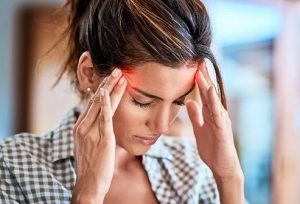How to prevent and treat migraine
Disease treatment
The purpose of migraine treatment is to reduce or stop the onset of headaches, relieve the associated symptoms, and prevent headaches from recurring. Treatment includes both drug treatment and non-drug treatment. Non-drug treatment is mainly physical therapy. Magnetic therapy, oxygen therapy, and psychological counseling can be used to relieve stress, maintain a healthy lifestyle, and avoid various migraine triggers. Drug treatment is divided into seizure treatment and preventive treatment. For best results during seizure treatment, medication should usually be taken immediately after the onset of symptoms. Therapeutic drugs include non-specific analgesics such as non-steroidal anti-inflammatory drugs (NSAIDs) and opioids, and specific drugs such as ergot preparations and triptans. Drug selection should be based on comprehensive consideration of headache severity, concomitant symptoms, and previous medication, etc., for individualized treatment.
1. Mild-to-moderate headache: NSAIDs such as acetaminophen, naproxen, ibuprofen, etc. alone can be effective, if not effective, then use migraine specific treatment drugs. Opioids such as pethidine are also effective in the diagnosis of acute migraine attacks, because of their addictive nature, and are not recommended for routine treatment of migraine, but for cases where ergot preparations or triptan are contraindicated, such as Complicated with heart disease, peripheral vascular disease or migraine during pregnancy, pethidine can be given to stop the acute attack of migraine.
2. Moderate-severe headache: Migraine specific treatment drugs such as ergot preparations and triptan drugs can be directly selected to improve symptoms as soon as possible. Although some patients have severe headaches but have responded well to NSAIDS in the past, they can still be used. NSAIDS. ① Ergot preparations: non-selective agonists of 5-HT1 receptors. The drugs include ergotamine and dihydroergotamine (DHE), which can stop the acute attack of migraine. ② Triptan: It is a selective 5-HT1B / 1D receptor agonist, which may exert analgesic effect by constricting cerebral blood vessels, inhibiting neuropathic transmission of peripheral nerves and secondary neurons of the “trigeminal neck complex”. Commonly used drugs are sumatriptan, naratriptan, rizatriptan, zomitriptan, and amotriptan. The ergot and triptan drugs adverse reactions include nausea, vomiting, palpitations, irritability, anxiety, and peripheral vasoconstriction. A large number of long-term applications can cause hypertension and ischemic necrosis of the limbs. The above two drugs have a strong vasoconstrictive effect, and patients with severe hypertension, heart disease and pregnant women are contraindicated. In addition, if ergot and triptan drugs are applied too frequently, they may cause overdose headaches. To avoid this, it is recommended that the drugs be used for no more than 2 to 3 days per week.
3. Concomitant symptoms: Nausea and vomiting are concomitant symptoms of prominent migraine and common adverse reactions to drugs. Therefore, combined antiemetics (such as metoclopramide 10mg intramuscular injection) are necessary. For severe vomiting, it can be given Small doses of perphenazine and chlorpromazine. People with irritability can be given benzodiazepines to promote sedation and fall asleep.
Disease prognosis
The prognosis for most migraine patients is good. Migraine can be relieved gradually with the increase of age, and some patients can stop migraine from 60 to 70 years old.

prevent disease
1. Avoid headache-causing factors: To prevent the onset of migraine headaches, first eliminate or reduce the causes of migraine headaches. In daily life, avoid direct stimulation of strong light, such as avoiding looking directly at the reflection of automobile glass, and avoiding from darker rooms. Bright outdoor view. Avoid facing neon lights. Avoid emotional stress, avoid taking drugs such as vasodilators, avoid drinking red wine and eating foods containing cheese, coffee, chocolate, smoked fish, etc.
2. Drug treatment: Preventive treatment is suitable for: ① Frequent attacks, especially those with more than one attack per week that seriously affect daily life and work; ② The treatment in the acute phase is ineffective, or the acute phase treatment cannot be performed due to side effects and contraindications. ; ③ special variant migraine that may cause permanent neurological deficits, such as hemiplegia migraine, basal migraine or migraine infarction. Prophylactic drugs need to be taken daily, at least 2 weeks after the drug is effective. If there is an effect, continue to take it for 6 months, and then gradually reduce the dose to discontinuation. The clinical drugs for migraine prevention include: ① beta adrenergic blockers such as propranolol and metoprolol; ② calcium antagonists such as flunarizine and verapamil; ③ Epilepsy drugs, such as valproic acid, topiramate; ④ antidepressants, such as amitriptyline, fluoxetine; ⑤ 5-HT receptor antagonists, such as phenothiazine. Among them, propranolol, amitriptyline, and valproic acid are three structurally unrelated drugs, which are the main preventive treatment drugs. If one drug is ineffective, another drug can be used.
Disease care
At present, there is no specific treatment method, which can eradicate migraine. The most effective treatment is to prevent the inducing factors during the interval of migraine headache. details as follows:
Stay away from tyrosine foods
Tyrosine is the main cause of vasospasm and easy to cause headaches. Such foods include: cheese, chocolate, citrus foods, and pickled sardines, chicken liver, tomatoes, milk, lactic acid drinks, etc.
Reduce alcohol intake
All alcoholic beverages cause headaches, especially red wine contains more chemicals that cause headaches. If you must drink, it is best to choose colorless wines such as vodka and white wine.
Learn to decompress
Relax, choose bubble warm water bath, do yoga and other relaxation exercises to avoid headaches.
Regular movement
For people with migraine, focusing on breathing training and breath-adjusting exercises (such as yoga and qigong) can help patients stabilize the autonomic nervous system, reduce anxiety, and tighten muscles.
living habits
Create a quiet environment, maintain a regular schedule, and go to bed and wake up regularly even on holidays.

